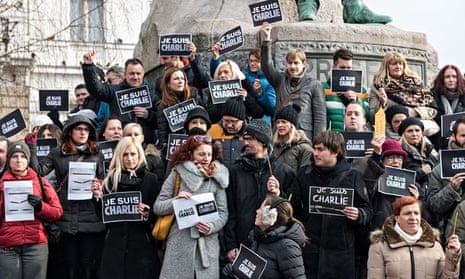Charlie Hebdo put media at the heart of the story as well as on the periphery. Debates about how the story was told and which pictures and cartoons used, even a small satirical magazine’s survival – what do they matter when set against so many dead and injured, including journalists, and such a brutal attack on the freedoms we hold so dear?
In such a fast-moving story, and despite the horror of the events, it is not too early to take stock of what it says about the media itself, not least because it was the attack’s target. For the lessons from Charlie Hebdo will resonate for years for the media industry as well of course for grieving relatives and societies riven by such violent discord.
But if 9/11 made global viewers of us all, the Charlie Hebdo massacre was the moment when online and social media were where we gathered: it dominated the information we shared and reacted to. If nothing else, it appears the media has learned something from its dismal performance after the Boston marathon bombing.
In April 2013, suspects were repeatedly misidentified, facts left unchecked and mistakes made by mainstream media organisations overwhelmed by the sheer volume of information being thrown at them by online reports and social media. From the New York Post saying that Arab (or at the very least Middle Eastern) men were to blame for the attack, to the errors repeatedly made by the cable news networks, much of the coverage was hideously inadequate to the demands of the age. It was so bad that the Boston police department was able to claim its own social media victory, saying it had used Twitter and other channels to correct the “misinformation spread by professional media outlets and social media itself”.
By late Friday night, no glaring mistakes of this magnitude had emerged. Yes, there was the NBC apology after its Nightly News programme erroneously reported that one of the Charlie Hebdo shooting suspects was dead and the other two were in custody. And so many reporters tried to contact Laurent Léger, the Charlie Hebdo reporter who raised the alarm from inside the conference room, before anyone really knew if he was dead or alive that Gawker criticised the “rush to interview [the] potentially dead” reporter. But, given the sheer volume of information coming out of Paris, some mistakes were at the very least understandable if quickly changed. Where once reporters may have enjoyed speedily spreading information much more than apologising quickly for mistakes, this behaviour is no longer viable.
On Wednesday, the day of the attack, Twitter seemed to defy naysayers of its own usefulness by offering updates and support in a news feed that became addictive. By the day’s end it had spread the story of solidarity and within 24 hours there were more than 3.4m mentions of #JeSuisCharlie. Online news had to be followed alongside social for a curation of videos with the most horrifying bits taken out, as well as the ability to strip out the people clogging up timelines talking about their booze‑free January.
TV news struggled to keep up at first. Yes, big guns were sent to Paris – Huw Edwards and Mark Austin among them – but Wednesday night’s BBC1 10pm news and Newsnight were frustratingly slow in reacting compared with the fast-moving wave of information on live blogs and social media.
Having said that, the BBC was yet again the place the nation turns to for analysis of big events. Average viewing figures for BBC1’s 6pm news rose to 5.8 million on the day of the attack, well above its 4.6 million average for 2014. The increase was almost as marked at 10pm.
There are losers in terms of cultural expression and attitudes, of course. The debate over whether to publish pictures of Muhammad was in danger of turning into an us-against-them fight that defied the fact that Charlie Hebdo itself, anti-establishment and anti-all religion, revels in its difference and devil-may-care attitude. Showing support for freedom of expression but supporting difference, a conundrum for everyone not just the media.
Support came in other ways, from cartoonists pledging their work, to media organisations, including the Guardian, pledging money, and vigils around the world.
One other thing we learned was how different the reaction from an essentially state-backed media could be. Within days of the massacre, a digital press fund paid for by Google (after being more or less coerced into it by a French state in support of its ailing newspapers) had earmarked €250,000 (£195,000) for Charlie Hebdo’s survival. Three French media titans – Radio France, France Télévisions and Le Monde – united to urge the rest of the industry to join in. Imagine that happening in the UK or US?
But whatever lessons were learned, the most striking image from this awful week at the start of 2015 were those of international protest by people holding pens and pencils aloft, a universal show of support for an industry where such things are today so rare.

